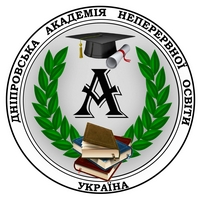ACMEOLOGICAL COMPETENCE OF THE HEAD OF A GENERAL SECONDARY EDUCATION INSTITUTION IN THE CONDITIONS OF CHANGES
Abstract
The purpose of the article is to determine the structure and content of acmeological competence of the head of a general secondary education institution, the latest technologies, psychological and acmeological conditions and factors of its productive development. The article reveals the essence of managerial competence of the head of a general secondary education institution. It is noted that it includes special types of competences, among which acmeological competence plays a leading role as the most important condition for the professionalism of management personnel. The acmeological competence of the head of the institution of general secondary education is in the space of research of competence and its special types: social, professional (autoprofessional), individual social-perceptive, autopsychological, psychological-pedagogical, conflictological, communicative, anti-crisis and other competences. The algorithm for the formation of managerial (autoprofessional acmeological) competence involves the sequential implementation of the following stages: actualization of personal and professional problems; formation of the subject of self-transformation activity; tasks of the indicative basis of self-transforming actions; formation of the operational and technological component of self-transforming activity; transition from external (materialized) to internal (psychological) actions. Indicators for evaluating self-professional competence are: behavioral and intellectual flexibility; adaptability; the ability to self-manage (own development, emotional states); a high level of motivation mainly for the process of selfimprovement and self-realization; adequacy of self-assessment; self-identification in the profession, etc. Acmeological competence of heads of general secondary education institutions is structurally a unity of the following components: cognitive, regulatory, reflective-status, normative and communicative, which in turn are manifested in motivational and personal qualities and operational acmeological knowledge and skills. The criteria for the development of acmeological competence of the head of a general secondary education institution are its levels, and both individual and levels of development of the teaching staff, the productivity of personal and professional development and self-development. The structure of the acmeological algorithm for the development of the acmeological competence of the head of the institution of general secondary education is revealed: the accumulation and understanding of the relevant acmeological and managerial knowledge; formation of psychological and acmeological abilities and skills necessary in managing the processes of personal and professional development and self-development; reflection of acmeological competence and its further development. The main acmeological conditions for the development of the acmeological competence of the head of a general secondary education institution are defined: the formation of the need for professionalism in the field of education, increasing the social status and prestige of pedagogical activity, providing the necessary resource opportunities for development, creating an acmeological environment in an educational institution. The essence and features of the professional self-improvement of the head of a general secondary education institution as a conscious purposeful process of increasing the level of one’s own professional (managerial) competence and the development of professionally significant qualities are considered.
References
2. Гладкова В. М. Професійне самовдосконалення менеджерів вищих навчальних закладів. Монографія. Київ: Освіта України, 2013. 355 с.
3. Гладкова В. М. Адаптивний акмефʼючеринг – технологія прогнозування саморозвитку фахівця ХХІ століття. Інноваційні підходи до розвитку особистості: монографія. Частина 3. Глава 1. Одеса: Купрієнко С. В., 2020. С. 13–30.
4. Гладкова В. М. Фундаментальна акмеологія – наука ХХІ століття. Монографія. Київ: Інтерсервіс, 2019. 206 с.
5. Гречаник О. Є., Григораш В. В. Формування акмеологічної компетентності вчителя в системі післядипломної освіти: монографія. Харків: Основа, 2019. 144 с.
6. Добош О., Пинзеник О. Управлінська акмеологія керівника закладу дошкільної освіти: теоретичний аспект. Молодь і ринок. 2023. № 5 (213). С. 154–159.
7. Іщенко І. А., Шалаєва В. В. Формування професійної компетентності керівників навчальних закладів. Управління школою. 2010. № 3. С. 2–5.
8. Клокар Н. Управлінські компетентності директора школи: сучасні тенденції. URL: https://lib.iitta.gov.ua/717740/1/%D0%A1%D0%A2%D0%90% D0%A2%D0%A2%D0%AF%20%D0%9A%D0%9D%D0%A3%20%D1%96%D0%BC.%D0%A8%D0%95%D0%92%D0%A7%D0%95%D0%9D%D0%9A%D0%90.pdf (дата звернення 25.06.2023).
9. Ковганич Г. Концептуальні засади розвитку акмеологічного навчального закладу. Завуч (Шкільний світ). 2015. № 12. С. 23.
10. Компетентнісний підхід у сучасній освіті: світовий досвід та українські перспективи: Бібліотека з освітньої політики/ під заг. ред. О. В Овчарук. Київ: «К.І.С.», 2004. 112 с.
11. Орбан-Лембрик Л. Е. Психологія професійної управлінської діяльності. Освіта і управління. 2005. Т. 8. № 3–4. С. 58–66.
12. Поліщук В. П. Психологічний аналіз управлінської діяльності директора навчально-виховного закладу. Шлях освіти. 2002. № 7. С. 12.
13. Пудрій Н. Г. Акмеологічний підхід в управлінській діяльності директора школи. Управління школою. 2015. № 34–36. С. 15–26.
14. Сергеєва Л. М. Сучасні орієнтири змісту управлінської компетентності керівника навчального закладу. Теорія та методика управління освітою. 2010. № 3. С. 23.
15. Уйсімбаєва Н. В. Компетентнісний підхід до підготовки керівника навчального закладу. Наукові записки. Cерія: педагогічні науки. 2008. Вип. 107. С. 206–212. URL: https://core.ac.uk/download/pdf/53036299.pdf (дата звернення 25.07.2023).
16. Холостенко Т. В. Управлінська компетентність керівника позашкільного навчального закладу «Дитячо-юнацька спортивна школа» в контексті акмеологічного підходу. URL: https://scienceandeducation.pdpu.edu.ua/doc/2011/7_2011/22.pdf (дата звернення 23.03.2023).

 ISSN
ISSN  ISSN
ISSN 

